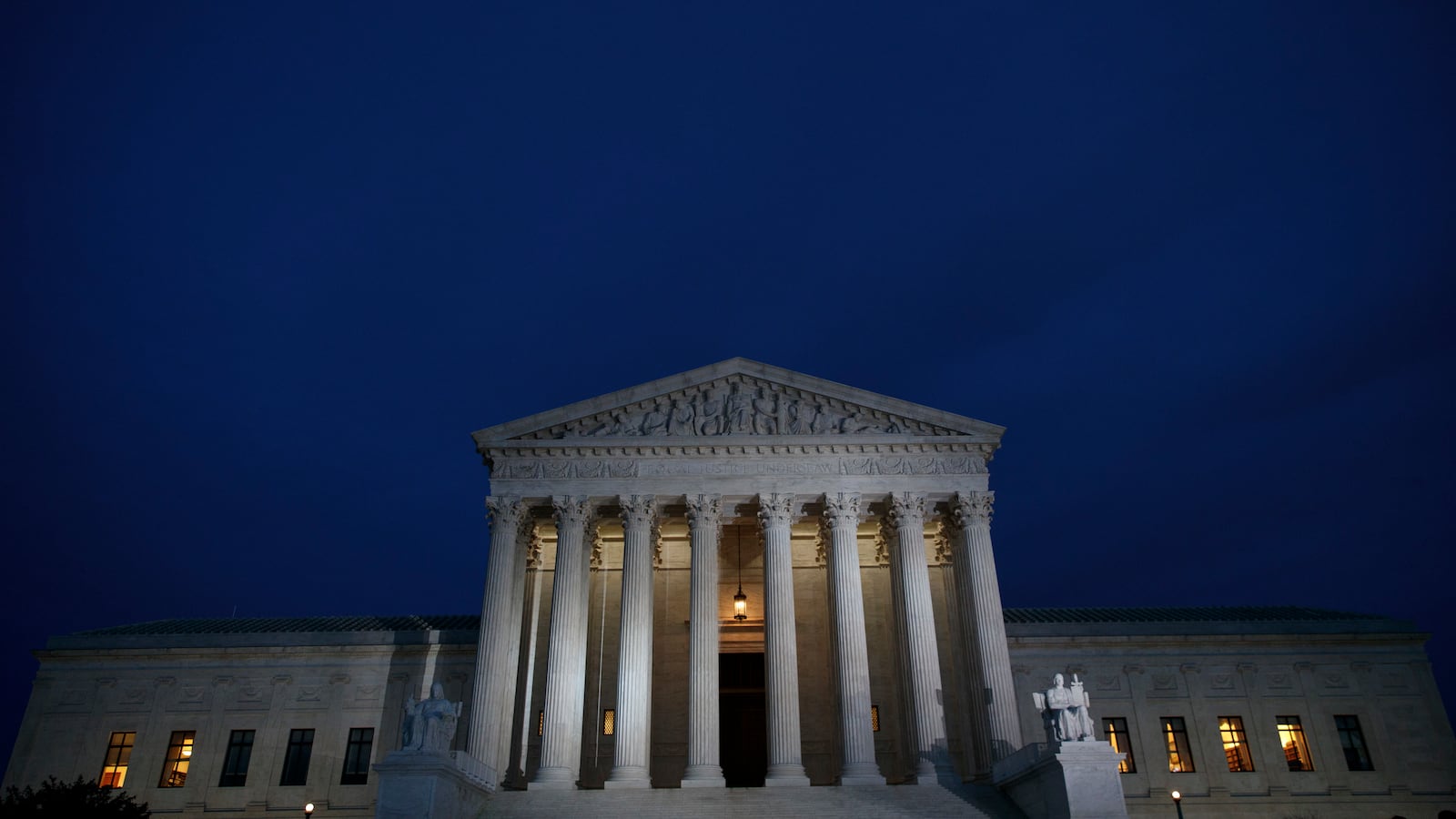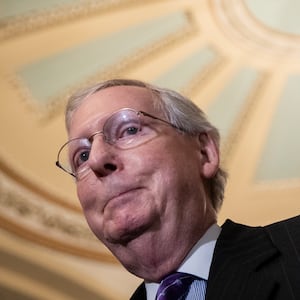Democrats—livid and galvanized by the GOP’s confirm-at-all costs approach to the new U.S. Supreme Court vacancy—have spent the last 24 hours boosting their 2020 candidates, rallying around the banner of Merrick Garland, and, increasingly, hashing out their own scorched-earth political tactics.
“Mitch McConnell set the precedent. No Supreme Court vacancies filled in an election year,” tweeted Sen. Ed Markey (D-MA), hours after the death of Justice Ruth Bader Ginsburg on Friday. “If he violates it, when Democrats control the Senate in the next Congress, we must abolish the filibuster and expand the Supreme Court.”
The idea, previously confined to the party’s left flank, is quietly gaining steam among staffers and aides in corners of the Senate Democratic caucus, who were livid on Saturday at seeing Sen. Lindsey Graham (R-SC) and other top Republicans urging a swift confirmation of President Trump’s nominee—whoever that person ends up being—after blocking Garland, Obama’s nominee, in 2016, by saying the voters should decide who got to fill the slot.
On a caucus conference call Saturday to discuss the party’s strategy, Senate Minority Leader Chuck Schumer (D-NY) spoke to that anger. “If Leader McConnell and Senate Republicans move forward with this, then nothing is off the table for next year,” Schumer told his members, according to a source on the call. “Nothing is off the table.” Though Schumer didn’t endorse the court-packing idea explicitly, plenty of Democrats interpreted his remarks as a careful nod to it.
But if Democrats aimed to present an aggressive posture heading into what’s expected to be a brutal confirmation fight, Trump’s political orbit reacted with chuckles and yawns to the ratcheted-up rhetoric on court-packing.
Six sources across Trumpworld—administration officials, campaign aides, and others close to the White House and the president—told The Daily Beast they weren’t worried about such a threat, even in a scenario in which Democrats were to take back the White House and Senate and hold onto the House. Some said such a proposal would inevitably backfire and become politically advantageous for conservatives. Others weren’t even sure if Democrats would have the internal support or, ultimately, the guts to actually pull the trigger on packing the court.
“It almost destroyed FDR. It should really backfire on them,” Rudy Giuliani, the former New York City mayor who’s served as President Trump’s personal lawyer, told The Daily Beast on Saturday night. Asked about his thoughts on Trump’s potential next Supreme Court nomination, Giuliani gave something of an endorsement of Amy Coney Barrett, a federal judge in Indiana who is considered one of the top choices on Trump’s shortlist. “AMY BARRETT WOULD BE EXCELLENT AND I BELIEVE PRESIDENT SHOULD DO IT NOW,” messaged Giuliani in all-caps, “WHOMEVER HIS CHOICE IS?”
Indeed, there’s likely to be substantial opposition to the court-packing idea within the Democratic caucus if they ever get the chance to do it. In any Democratic Senate majority, a handful of moderates are likely to have the greatest sway on key votes—and they’re unlikely to ever get on board with the idea.
But there’s also concern that the rhetoric could backfire, even if its main purpose right now is as a messaging tactic. Democrats’ path to capturing the Senate majority runs through states Trump won in 2016, where a slate of moderate candidates are running careful campaigns focusing largely on health care and the COVID-19 response.
For example, Cal Cunningham, the Democratic challenger to Sen. Thom Tillis (R-NC), doesn’t need to be debating whether he wants to pack the court in the last 40 days of the election, a Democratic operative told The Daily Beast. “That’s an argument that doesn’t get anywhere,” said the operative.
As Democrats debated the merits of the court-packing issue, key Republicans laid out their plans for the high court vacancy at hand, charting a course that could be equally fraught for the GOP’s hold on the White House and the Senate. Heading to a rally on Saturday, Trump said a nominee could be announced as soon as next week; on Friday night, McConnell announced that Trump’s nominee for the court “will receive a vote” on the Senate floor.
“Both the White House and the Senate majority have a moral duty to fulfill the promises they made to the voters, and that is exactly what we are going to do,” the president said at a North Carolina campaign rally on Saturday night. Trump has also told the crowd that “I could see most likely [the nominee] would be a woman.”
Crucially, McConnell didn’t specify whether that vote would come before or after the Nov. 3 election. Privately, many Republicans believe it would be tough for McConnell to hold a vote before the election due to the varying political implications of that vote for the GOP majority that is at risk this November. A lame-duck session, which ends on Jan. 3 with the swearing-in of the new Congress, is seen as a more likely venue for a confirmation battle.
The high court vacancy is going to sway the election no matter when the vote occurs, however: with a Trump nominee soon to be named, the GOP conference’s most vulnerable members will face questions over their views on that pick during the crucial closing days of the election. Some are already being hammered: Sen. Cory Gardner (R-CO), facing one of the toughest battles in the country, was asked in a Saturday appearance if he stood by his 2016 stance that a vacancy should wait until after the election. He didn’t answer the question, instead pivoting to praise of Ginsburg’s life and accomplishments.
A nominee who clearly views Roe v. Wade as incorrectly decided‚ as some on Trump’s shortlist do, is set to be a problem for Sen. Susan Collins (R-ME), who defended her vote for Justice Brett Kavanaugh in part because she believed he considered Roe to be settled law. An injection of abortion politics into Collins’ battle against Democratic candidate Sara Gideon, who has led in nearly all public polls of the race, is seen by some Democrats as basically sealing Collins’ defeat.
That Collins announced on Saturday that she will oppose any confirmation vote before the election—and that the winner of the presidential race should get the next pick—is unlikely to ward off the scrutiny.
There’s also the issue of health care: some members of Trump’s shortlist, such as Barrett, have disputed the court’s 2012 decision upholding the Affordable Care Act. That law, and GOP attempts to dismantle it, are at the center of Democrats’ playbook against vulnerable incumbents like Tillis and Gardner. With the court expected to hear another challenge to Obamacare after the election—this time missing one more liberal justice—Democrats see the health care implications of the fight as central to the politics of the confirmation fight.
When it comes to the actual confirmation itself, four Republicans would be needed to join with all Democrats to block a nominee. Democrats acknowledge that this will be a tough task; if Trump selects a strong nominee, it could be even more problematic. A judge reportedly on Trump’s shortlist, Barbara Lagoa of Florida, earned 26 Democratic votes in her confirmation to the 11th Circuit Court of Appeals last November—an unusually high number for a Trump nominee. Democrats also see Britt Grant, another 11th Circuit judge on the shortlist, as a formidable pick after a smooth confirmation hearing in 2018.
Either way, many Capitol Hill Republicans have the utmost faith in McConnell to handle the situation as he sees fit. “He played things perfectly with Garland and Kavanaugh, and through those instances he has proven to the base that he will assume all sorts of political risk and heat to ultimately get an outcome desirable for conservatives,” said a senior GOP congressional aide. “I think everyone has the expectation that he will do that again now.”







